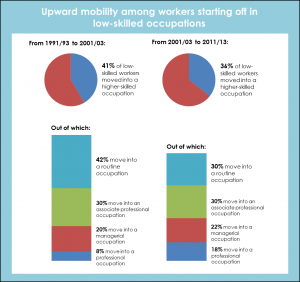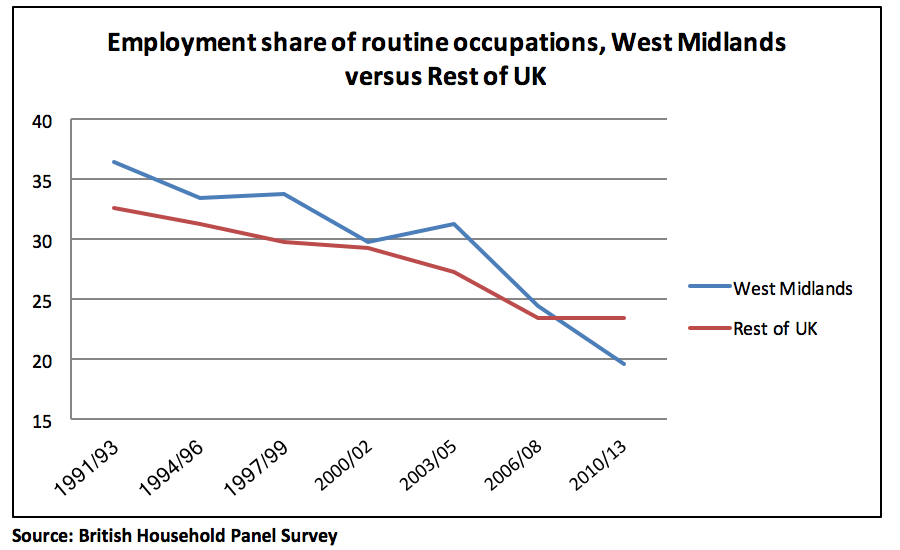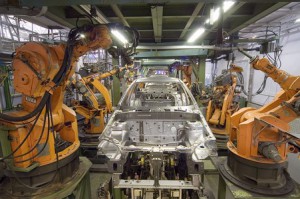Guest post by Sanne Velthuis, Doctoral Researcher, Centre for Business in Society
In recent years a growing chorus of voices has been sounding alarm bells about the rise of robots poised to take our jobs. While in the popular media debate about the impact of technology tends to focus on the question of whether or not we are facing a world without work – for better or for worse – a more immediate question is what impact automation is already having on the workforce today. Academic studies have shown that technological development, whether this is in the form of new machinery or computer software, has had a transformational effect on the labour market over the past several decades. They have identified one effect in particular, and that is the declining numbers of intermediate-skilled jobs involving relatively routine tasks. These occupations, which include administrative and secretarial occupations as well as middle-skilled manufacturing jobs, have fallen in terms of employment share in the UK as well as in many other advanced economies. The decline in these routine occupations has not (yet) led to a fall in the overall number of jobs in the labour market, as growth in other occupations has more than compensated, but it has changed the shape of the labour market. Employment has become more concentrated in low-skilled, low-paid occupations on the one hand, and high-skilled, high-paid occupations on the other – a process referred to as labour market polarisarion.
Labour market change and career development
One important question arising from this is what has happened to the workers employed in these routine occupations? Studies from the UK and in the US suggest that workers have moved out of routine occupations – either to other occupations or economic inactivity – as routine occupations have declined, although in the UK this displacement appears to have been much stronger for older cohorts. A wider question is what these changes mean for broader patterns of career development, and specifically whether the decline in intermediate jobs has reduced the progression opportunities for workers in low-skilled occupations. This has potentially important implications for social mobility as well as the persistence of low-pay (something which is a sizeable problem in the UK).
The British Household Panel, a large longitudinal survey, provides some insights into this. Using data covering the period 1991 to 2013, the evidence shows that the types of routine occupations which have experienced declining employment shares have in the past been among the most common destinations for upwardly mobile workers starting off in low-skilled jobs (See Figure 1). Of all workers who in the early 1990s were employed in a low-skilled, low-paid occupation and who ten years later had moved into a higher-skilled, higher-paid occupation, 42 per cent had done so through a move into a routine occupation (compared to 20 per cent who had moved into a managerial occupation and 8 per cent who had moved into a professional occupation).
Figure 1: Upward mobility among workers starting off in low-skilled occupations
Source: British Household Panel Survey
In short, routine occupations appear to have been an important pathway for low-skilled workers to progress. However, as these occupations have declined as a proportion of total employment, progression via this route appears to have become more difficult. Among workers employed in low-skilled occupations in the early 2000s, fewer had managed to move into higher-skilled occupations ten years later compared to those starting off in low-skilled occupations a decade earlier. Falling mobility from low-skilled to routine occupations seems to have accounted entirely for this decline in upward mobility.
What does this mean for the West Midlands?
The West Midlands region has seen a sharper decrease in the numbers of routine jobs compared to the rest of the UK. Routine occupations such as secretaries, transport clerks, sheet-metal workers, and machinery mechanics used to represent a substantial proportion of the West Midlands labour force, but employment in these occupations has fallen steeply since the early 1990s. Routine jobs now represent a smaller share of employment in the West Midlands (20 per cent) compared to the rest of the country (23 per cent) (see Figure 2). Meanwhile, the proportion of low-skilled, low-paid jobs has increased from 22 per cent in the early 1990s to 29 per cent in 2010/13, and the proportion of highly-skilled jobs has grown from 41 per cent to 52 per cent over the same period.
Figure 2: Employment share of routine occupations, West Midlands versus Rest of UK
Source: British Household Panel Survey
Andy Street, the mayor of the West Midlands Combined Authority, is right to be positive about the growing regional economy, new industries such as electric vehicles and next-generation medicine, and the growing number of high-skilled jobs such industries will bring. Nonetheless a large proportion of workers remain employed in low-skilled and low-paid jobs. If a declining share of intermediate routine jobs is bad for upward mobility among low-skilled workers – which the initial evidence indicates it is – then more will need to be done to address problems of lower mobility and persistent low-pay. Making sure that there is a range of different employment opportunities for workers to aspire to, as well as equipping workers with the right skills to be able to access better-paid jobs in growing industries, will be key to ensuring that workers across the board can share in the success of the regional economy.

Computers are one of the most ubiquitous forms of automation. Image by Penn State Dubois. Licenced under Creative Commons.
Computers are one of the most ubiquitous forms of automation. Image by Penn State Dubois. Licenced under Creative Commons.
Improved technology has led to a gradual decline in manufacturing employment. Image by Mixabest. Licenced under Creative Commons Attribution-Share Alike 3.0 Unported license.







Comments are disabled